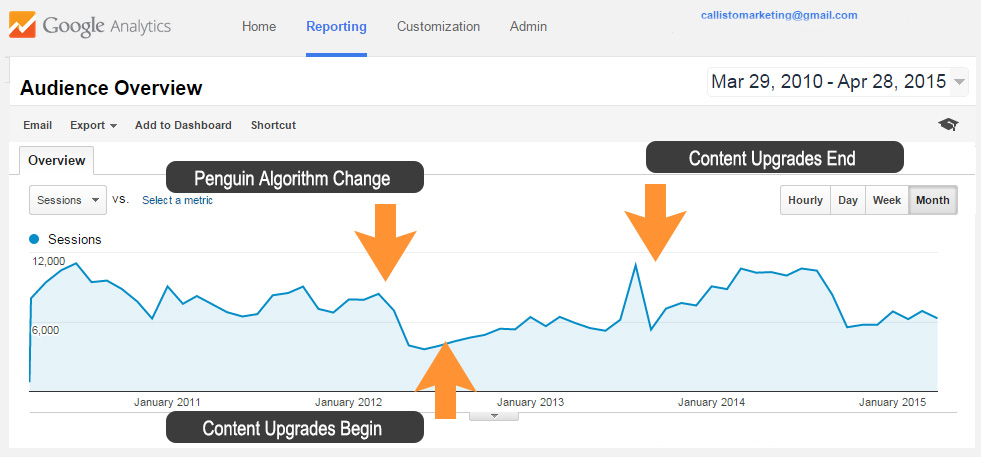How Content Marketing Saved A Site From the Penguin "Penalty"

How Important Is Maintaining Content Quality and Quantity In Fending Off Search Algorithm Changes?
While content marketing is really the baseline for increasing search engine visibility and traffic, it can also correct the core performance of a site as it stands. This is a rather extreme example where content additions helped recover from Google's Penguin algorithm adjustment.
A Good Example of Content Marketing’s Positive Performance
- A review did reveal some on page implementation problems such as duplicate, missing or abbreviated titles and meta tags (which were quickly corrected), but also some questionable links and possible repetition of content within the product descriptions
- The site itself had little subject-based content and relied on factors such as age, back link inventory, and product descriptions for ranking.
- It also had very few additions to boost its “recency” profile with the search indexes
- While there was a basic email list generated from purchases, it had not been utilized in any scheduled or measurable way (i.e. tracked for sales conversions, topic interest, subject line testing)
- The store had a fairly small inventory and product page count
- There had not been any significant paid traffic sources in at least a year

The average total traffic for each added page of content for this client over a 30 month period (after the page was added ) was 565 new visitors. The addition of 27 pages yielded a total of 15,202 total new visitors over that period. Although no new content has been added in the last 24 months, it we project these pages to continue to produce traffic, although at lesser amounts as the page content ages.
What We Did
- Because of the timing and speed of the downgrade (and that many other sites had similar problems at the same time), we made the decision that this change was more likely attributed to the then recent "Penguin" algorithm update because of link issues, duplicate content and poor keyword distribution
- Rather than request link changes from questionable sources (the Google "Link Disavow Tool" was not introduced until six months later), a decision was made to "offset" penalty issues by increasing content quantity and quality as a means to attract more authoritative links and address the other issues above
- We then followed our normal content creation program, starting with researching appropriate keywords to be targeted based on search potential and competition levels
- Created an editorial calendar and started publishing 800- 1000 word articles on pet-related topics, with proper SEO support, ending up with a modest 30 page count addition over the next six months
- Compiled an 80 page E-Book on the topics we had researched, which in turn was offered on the site in exchange for capturing a visitor email to help build their list.
The Results Of Diligent Content Marketing
- Garnered an extra 12,000 visitors to the site in the 30 months after the inception of the program for only subject-matter pages added.
- Regained 90% of the traffic level that was lost for the overall site from Google’s Penguin “penalty”
- 20% gross revenue increase for the period of program start (June 2012 to December 2012) despite the traffic reduction in the earlier part of the year
While there are many factors that go into recovering from one of Google's (frequent) algorithm changes, this particular intervention does demonstrate that a website's most basic contribution to generating high organic search traffic is maintaining it's content quality and, to some extend, quantity. It also shows that this particular approach can be used, at least in part, to offset other negative factors such as a poor link profile.
